- Environmental scientists
- Forensic chemists
- Intellectual property attorneys
- Laboratory technicians
- Pharmaceutical sales representatives
- Product development chemists
- Quality control analysts
- Regulatory affairs specialists
- Science educators (high school or college)
- Technical support specialists (chemical industry)
Chemistry
- Bachelor of Science
- Minor
- Teacher Certification Content Area
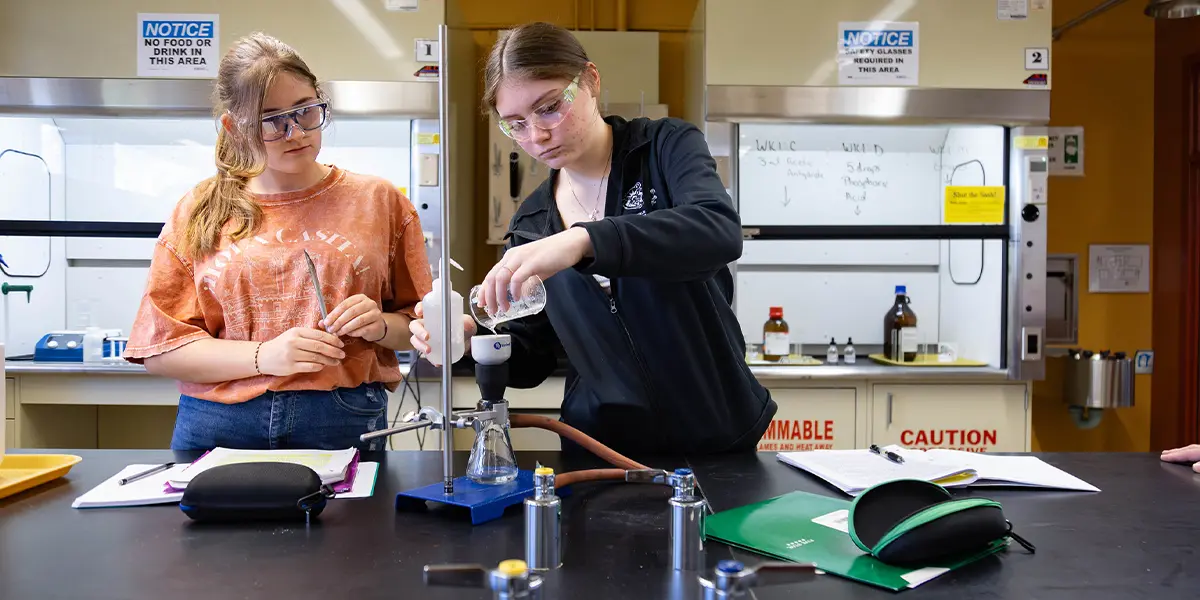
-
In This Section
Chemistry That Shapes Careers and Communities
Chemistry—often called the central science—is the foundation for breakthroughs in medicine, environmental science, biotechnology, and more. At Saint Vincent College, our Chemistry program equips students with hands-on lab experience, research opportunities, and internships that build strong technical and communication skills. Students train in specialized labs with advanced equipment, preparing for careers in fields such as manufacturing, technical sales and support, wetlands conservation, biotech labs, wineries, and even law offices. Those interested in a teaching certification in chemistry also receive the preparation needed to inspire future scientists in the classroom. Rooted in the Benedictine values of stewardship, community, and stability, our program fosters both scientific excellence and personal growth.
Chemistry Secondary Teaching Certification: Chemistry majors who minor in education will be prepared to acquire their teaching certification for grades 7-12. Learn more here: Education Certification: Grades 7-12.
Undergraduate Programs
Undergraduate Admission
Phone:
800-782-5549
Ext. 2500
Email:
admission@stvincent.edu
Program Highlights
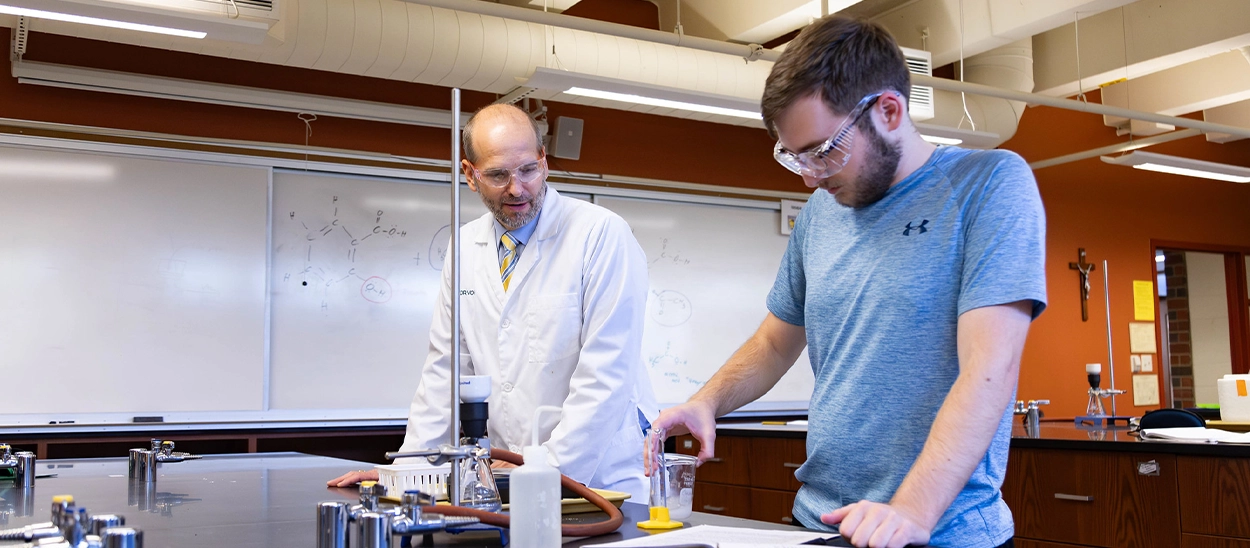
Collaborate on Faculty-Guided Research
All students work directly with a faculty mentor over three semesters to design, conduct, report, and defend an original research project. The results of these projects are presented each year at the College’s Academic Conference. Some students present their senior research work at professional conferences such as the American Chemical Society meeting or Pittcon.
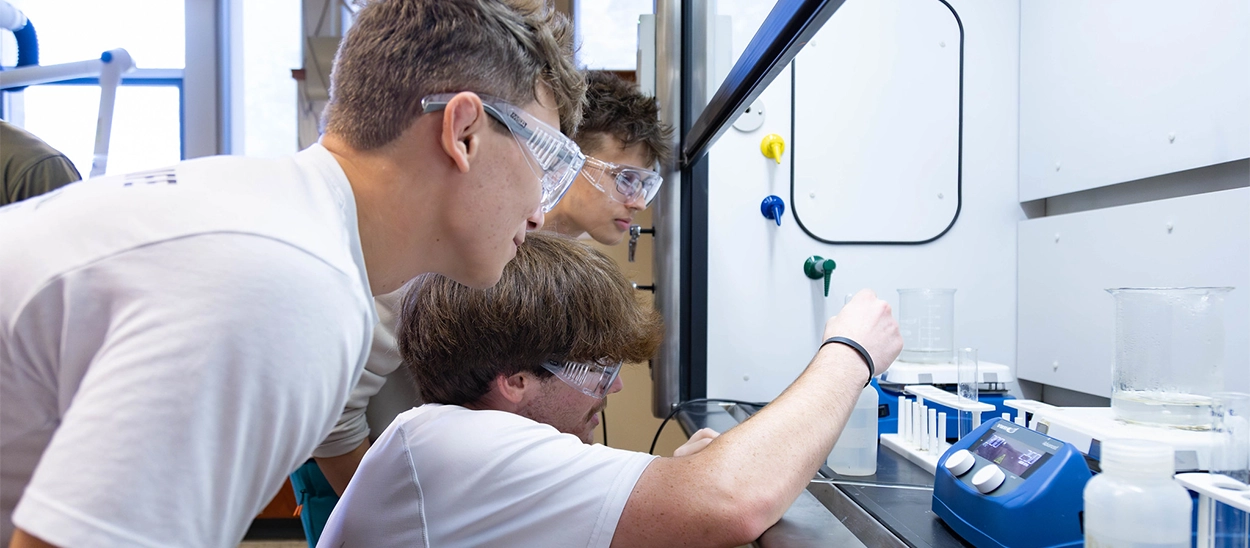
Build Your Chemistry Skills in Cutting-Edge Labs
You’ll work side-by-side with faculty in advanced lab spaces that reflect real-world research and industry environments. As you gain hands-on experience, you’ll learn techniques like titration, spectroscopy, chromatography, and synthesis, while sharpening your ability to communicate results and collaborate with others. You’ll also have access to state-of-the-art equipment—tools typically reserved for graduate-level work—giving you the confidence and technical expertise to thrive in any chemistry career path.
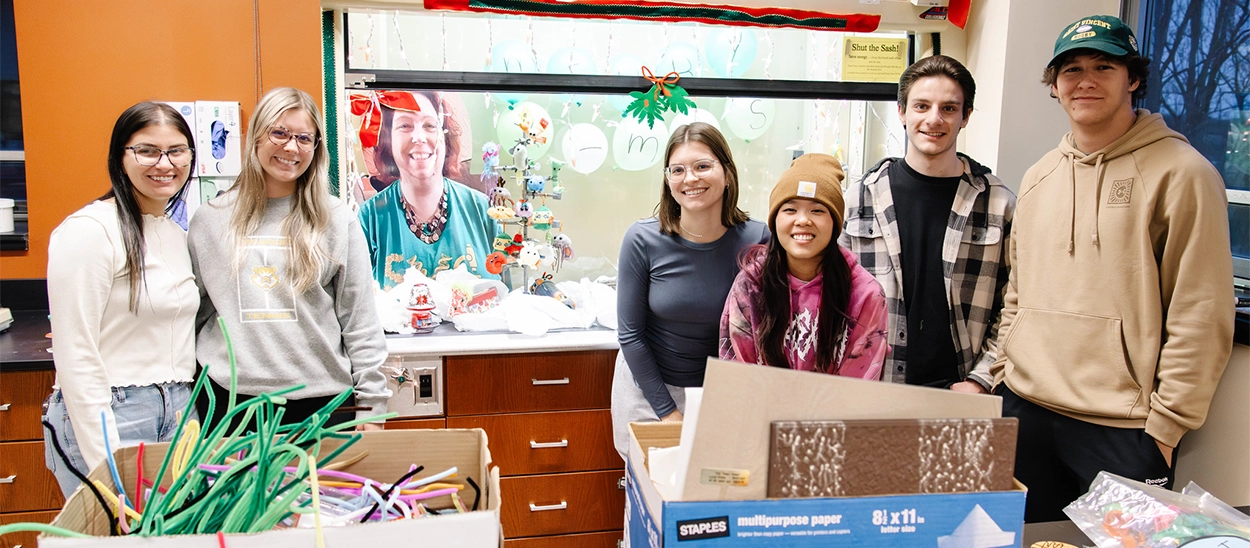
Join the Chemistry Club
You can join the Saint Vincent College Chemistry Club, a student affiliate chapter of the American Chemical Society (ACS), which has received awards of commendation from ACS for its service to the community, educational outreach and social events for the past 11 years. Our Chemistrees competition is a big hit during the holidays.
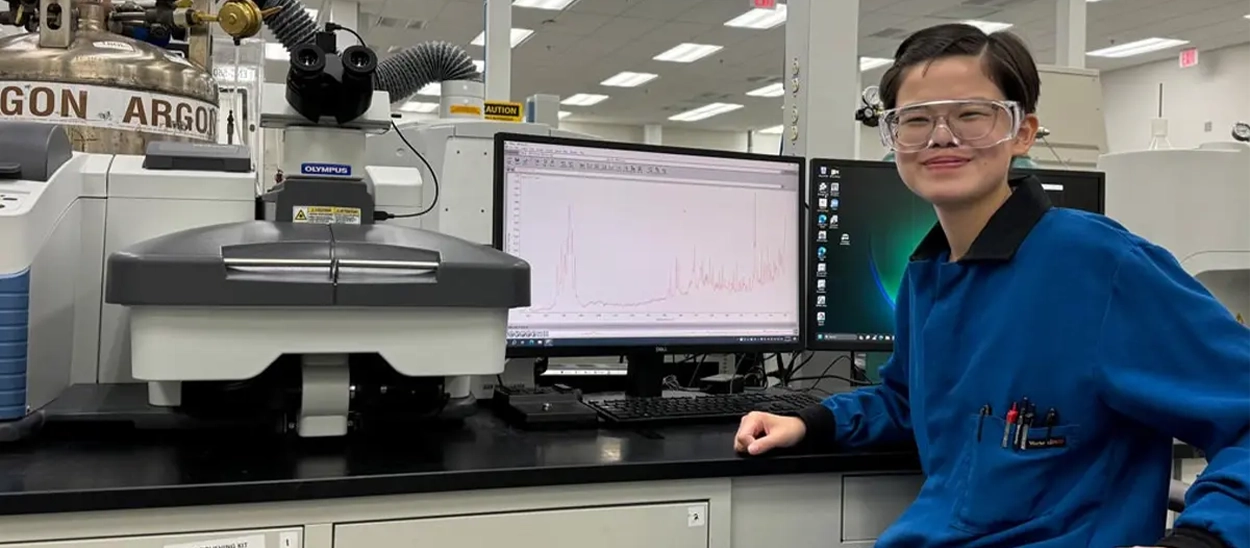
Prepare Confidently for your Future
You will have opportunities to secure internships in chemistry labs, research universities, and other corporations. Our graduates routinely earn admission to PhD programs, MS programs, or are hired into an industry position directly upon graduation. SVC chemistry graduates have gone on to Stanford University, University of Notre Dame, Penn State, University of Pittsburgh, and University of Florida. Companies that have employed our chemistry students include PPG, Kennametal, Bettis Atomic Power Laboratory, and Mylan Pharmaceuticals.
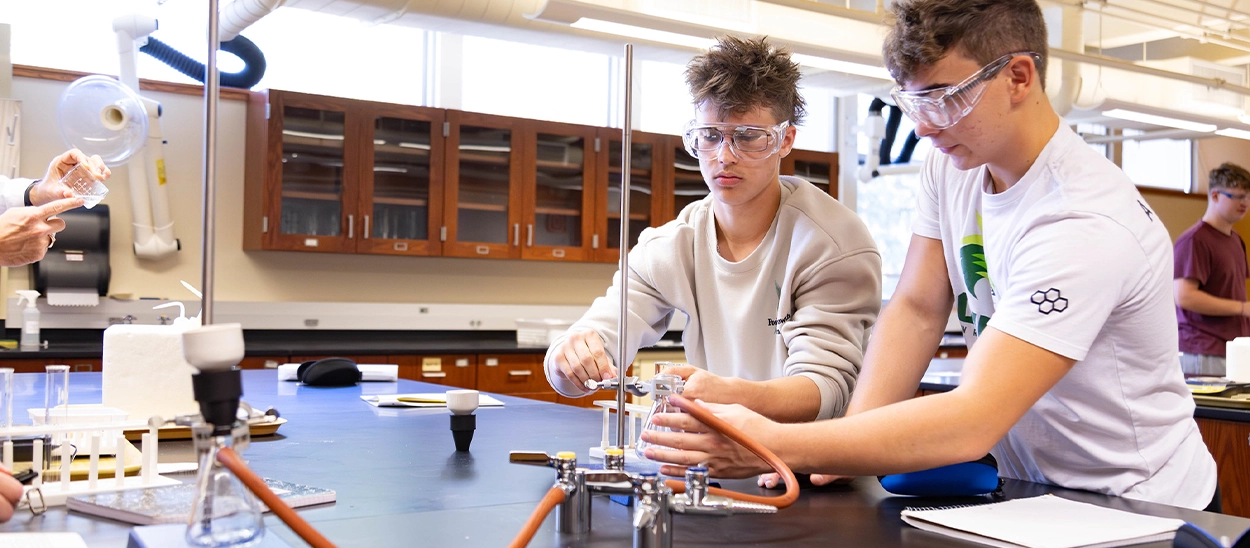
Field Experiences for Chemistry Education Students
Starting freshman year, students who are pursuing teaching certification will engage in field experiences that build essential skills in diverse settings. Integrated with coursework, these experiences allow immediate application of educational theories. Opportunities include lesson planning for homeschooling students in our STEP-Up Enrichment program, immersive co-teaching, and a 14-week student teaching internship. Learn more details about our educational field experiences.
Careers after Saint Vincent
At SVC, our chemistry program equips students with the foundational knowledge and practical skills needed to succeed in diverse careers in chemistry—from research and manufacturing to law, public policy, education, and nonprofit work. Through hands-on learning, faculty mentorship, and career development opportunities, students are prepared to enter the workforce or pursue advanced study with confidence and purpose.
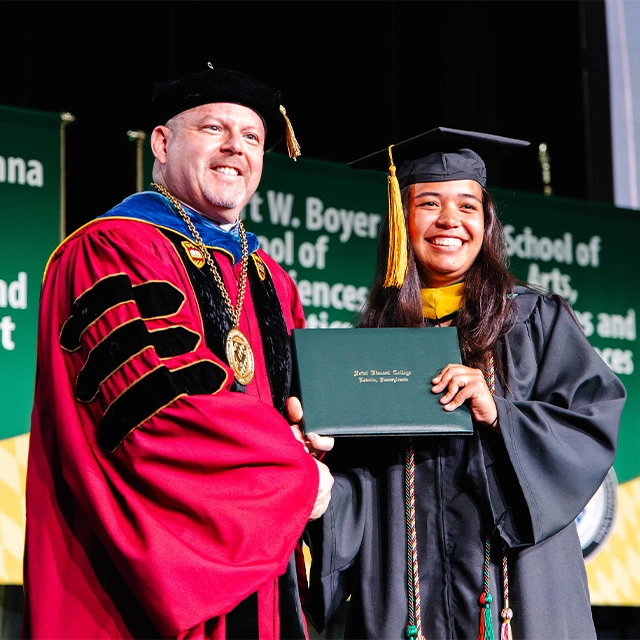
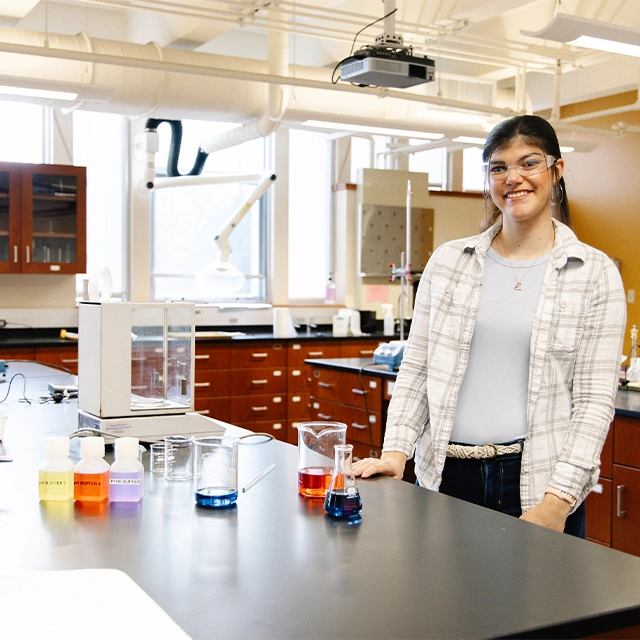
- PPG
- Kennametal
- Greensburg-Salem School District
- Hempfield Area School District
- Stanford University
- University of Notre Dame
- Penn State
- University of Pittsburgh
- University of Florida
- Clemson University
- University of Kentucky
- West Virginia University
Student Success Stories

Ethan Crace, C’14
“The biggest impact my education at SVC has had on my life was the quality of my education and the small class sizes during my undergraduate degree. After moving on to larger universities for my PhD and postdoc, I saw firsthand how enormous class sizes with a constantly rotating stock of teaching assistants could lead to students falling behind or not having their passion for science nurtured. I attribute my firm foundation in the various fields I study to the dedicated educators at Saint Vincent who I could work with closely throughout my education.”
X-ray Crystallography and XRD Lab Manager, Colorado State University
Loren Dokler, C’16
“The chemistry department at Saint Vincent College provided me with incredible opportunities that helped me grow personally and as a chemist. I built a Raman Spectrometer for my senior research, presented my research at the American Chemical Society conference, and learned numerous laboratory skills and instruments that I use every day at work. My husband and I met during Dr. Fisher's organic chemistry class and we made lifelong friends along the way.”
Senior QC Chemist, SymriseRequired Curriculum
The chemistry major is part of The Herbert W. Boyer School of Natural Sciences, Mathematics and Computing and supported by our core curriculum, where students delve into diverse academic subjects at both foundational and advanced levels to explore how different disciplines connect, fostering deeper self-understanding and proficiency in their chosen field of study.
-
Major - Required Courses
The chemistry major requirements strongly emphasize laboratory experiences that pull from the five major subdivisions of chemistry: analytical, biochemistry, inorganic, organic, and physical. Chemistry majors also take courses in laboratory synthesis and materials chemistry. Courses in the chemistry department build toward the senior research project, which serves as the “capstone experience” for students. In the three-semester Senior Research Program, students are fully engaged in all facets of developing and completing a research project.
- CH 101-102 General Chemistry I, II
- CH 103-104 General Chemistry Laboratory I, II
- CH 216 Quantitative Analysis
- CH 218 Quantitative Analysis Laboratory
- CH 221-222 Organic Chemistry I, II
- CH 223-224 Organic Chemistry Laboratory I, II
- CH 228 Introduction to Biochemistry
- CH 231-232 Physical Chemistry I, II
- CH 233 Physical Chemistry I Laboratory
- CH 241 Inorganic Chemistry
- CH 242 Instrumental Analysis
- CH 282 Advanced Physical Methods
- CH 283 Advanced Chemical Methods
- CH 301 Research Laboratory
- CH 300, 302 Research Seminar I, II
- CH 321 Special Topics
- MA 111, 112 Analytical Calculus I, II
- PH 111-112 General Physics I, II
- PH 113-114 General Physics Laboratory I, II
Plus, at least 3 credits from the following:
- MA 211 Analytical Calculus III
- BL 260 Biostatistics
- MA 311 Probability and Statistics I
- MA 241 Statistics I
-
Major: Education Track - Required Courses
These credits are in addition to those required by secondary education certification.
- CH 101-102 General Chemistry I, II
- CH 103-104 General Chemistry Laboratory I, II
- CH 216 Quantitative Analysis
- CH 218 Quantitative Analysis Laboratory
- CH 221-222 Organic Chemistry I, II
- CH 223-224 Organic Chemistry Laboratory I, II
- CH 231-232 Physical Chemistry I, II
- CH 233 Physical Chemistry I Laboratory
- CH 241 Inorganic Chemistry
- CH 242 Instrumental Analysis
- CH 282 Advanced Physical Methods
- CH 285 Teaching Chemistry
- CH 301 Research Laboratory
- CH 300, 302 Research Seminar I, II
- MA 111, 112 Analytical Calculus I, II
- PH 111-112 General Physics I, II
- PH 113-114 General Physics Laboratory I, II
Plus, at least 3 credits from the following:
- MA 211 Analytical Calculus III
- BL 260 Biostatistics
- MA 311 Probability and Statistics I
- MA 241 Statistics I
-
Minor - Required Courses
- CH 216 Quantitative Analysis
- CH 218 Quantitative Analysis Laboratory
- CH 221-224 Organic Chemistry I, II with Laboratory
Plus, at least six credits from the following:
- CH 231 Physical Chemistry I
- CH 241 Inorganic Chemistry
- CH 242 Instrumental Analysis
- CH 276 Advanced Environmental Chemistry
- CH 321 Special Topics
- CH 228 Introduction to Biochemistry
- CH 251 Proteins and Metabolism
- CH 252 Nucleic Acids and Membranes
-
Key Courses
Advanced Physical Methods: This course is an integrated laboratory that introduces advanced students to the physical and instrumental methods used by chemists. The laboratory experiments focus on spectroscopy, chromatography and other advanced physical and analytical techniques. Students in this course also learn about the integrated nature of chemical research and the methods of experimental design and report presentation.
Advanced Chemical Methods: This course is an integrated laboratory that introduces advanced students to aspects of experimental chemistry focused on making a variety of chemical substances. Laboratory experiments focus on advanced organic chemistry, inorganic chemistry, polymers, and materials science. The course also includes a strong emphasis on designing experiments and presenting results through written reports.
Special Topics: This course introduces students to topics of contemporary interest in chemistry. These are drawn from the following areas: organic and inorganic kinetics, stereochemistry, molecular orbital theory, spectroscopy, electrochemistry, solid state chemistry, polymer science, surface chemistry, and photochemistry.
Our Faculty
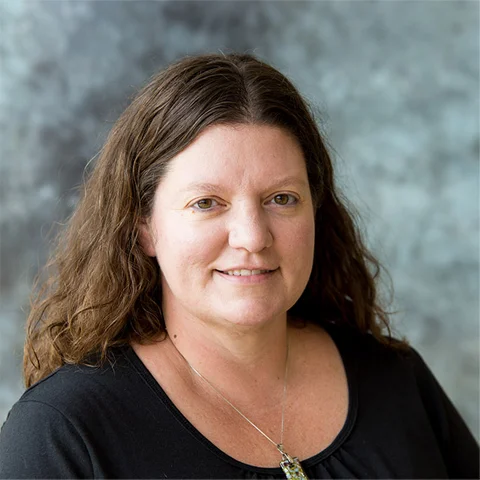
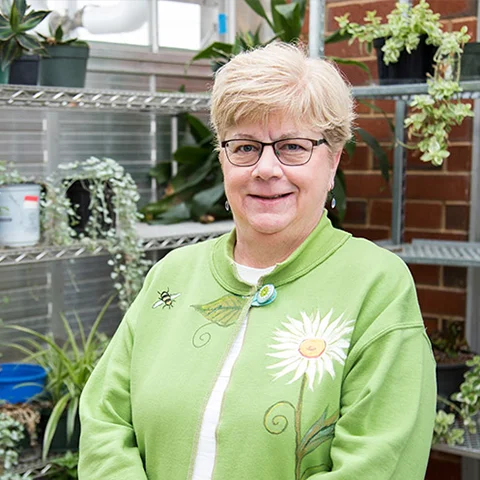
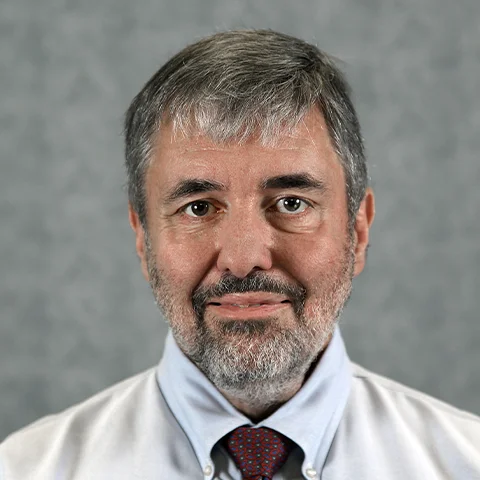

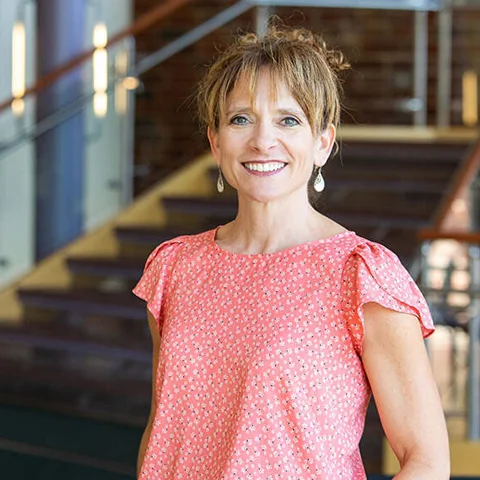

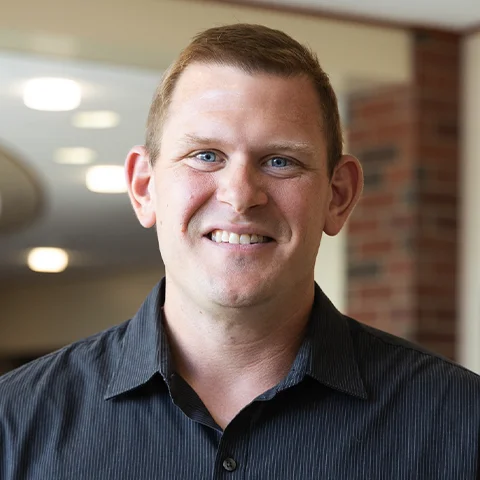
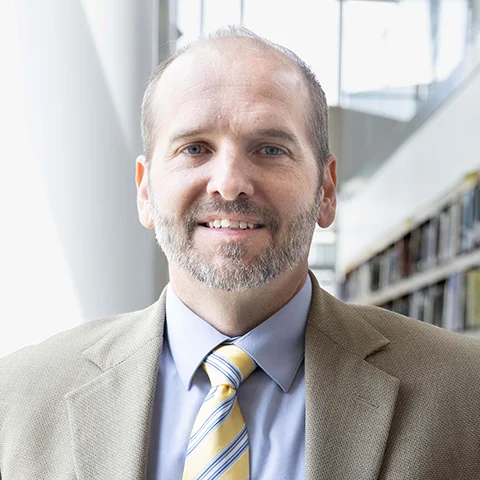
Facilities and Resources
-
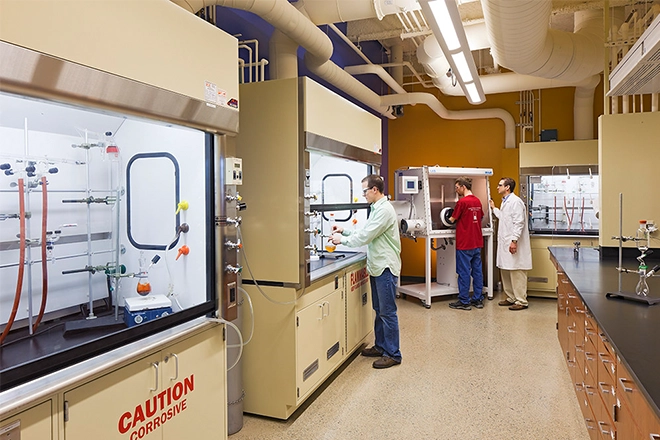
The Synthetic Chemistry Laboratory
This lab was designed for both small-group teaching and independent student research and includes fume hoods equipped with vacuum/gas manifolds for use in inert atmosphere chemical synthesis and a glovebox that provides an oxygen and water free environment for chemical manipulations. -
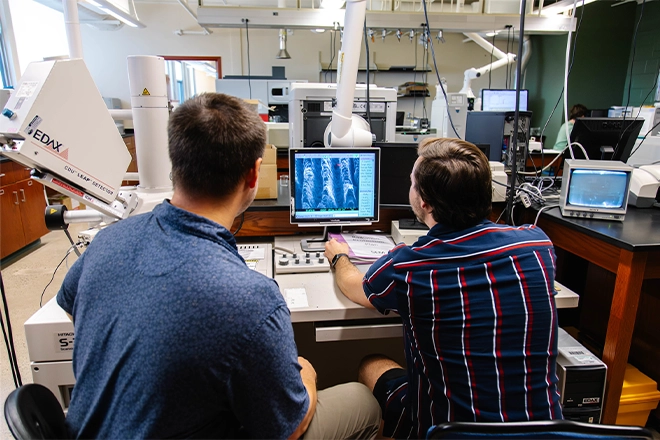
Instrument Laboratories
These laboratories are equipped with an impressive collection of scientific instrumentation for students to use when analyzing chemical compounds. All chemistry and biochemistry students are trained to operate, troubleshoot, and maintain all instrumentation housed in the instrument lab throughout upper-level coursework at Saint Vincent. Instruments currently available in the department include: Gas Chromatography Mass Spectrometer (GC/MS), High Performance Liquid Chromatography (HPLC), Inductively Coupled Plasma Atomic Emission Spectroscopy (ICP-AES), Microwave Plasma Atomic Emission Spectroscopy (MP-AES), Ion Chromatography (IC), Nuclear Magnetic Resonance (NMR), Fourier Transform Infrared Spectroscopy (FTIR), Scanning Electron Microscope (SEM), bomb calorimeter, laser bay, potentiostat, fluorimeter, and UV-Vis spectrophotometer. -
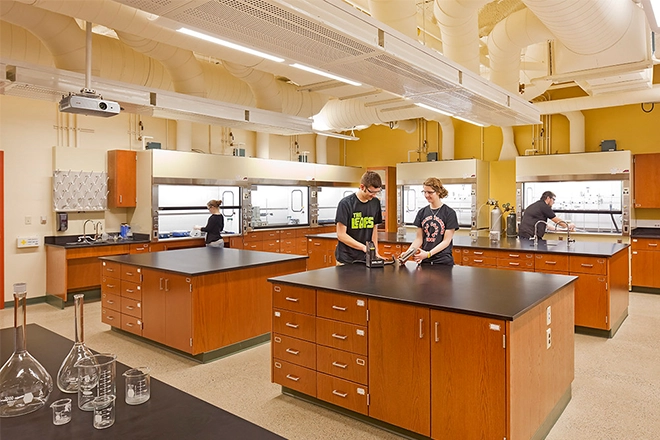
The Advanced Laboratory
This is an all-purpose lab space that can accommodate a wide variety of analytical and synthetic labs that students complete in the project-based lab courses Advanced Physical Methods (APM) and Advanced Chemical Methods (ACM). APM is a project-based lab course that incorporates techniques and concepts taught in Physical Chemistry and Instrumental Analysis. ACM is also a project-based lab course, but it focuses on advanced chemical synthesis techniques.
Program Distinctives
Student Learning Outcomes
- Students graduating with a degree in chemistry will have an understanding of chemical principles in organic, inorganic, physical and analytical chemistry that allows them to apply those principles to advanced topics.
- Students will be able to perform a variety of modern chemical laboratory techniques and run modern instrumentation.
- Students will be able to communicate in both oral and written forms that are appropriate to the modern practice of chemistry. Students should be able to apply the Six Principles of Good Writing to their chemistry writing.
- Chemistry students in their junior and senior years will be able to design, develop, conduct and report on an independent research project.
- Students will develop higher order thinking skills of synthesis, analysis and applications.
Undergraduate Programs
Undergraduate Admission
Phone:
800-782-5549
Ext. 2500
Email:
admission@stvincent.edu
